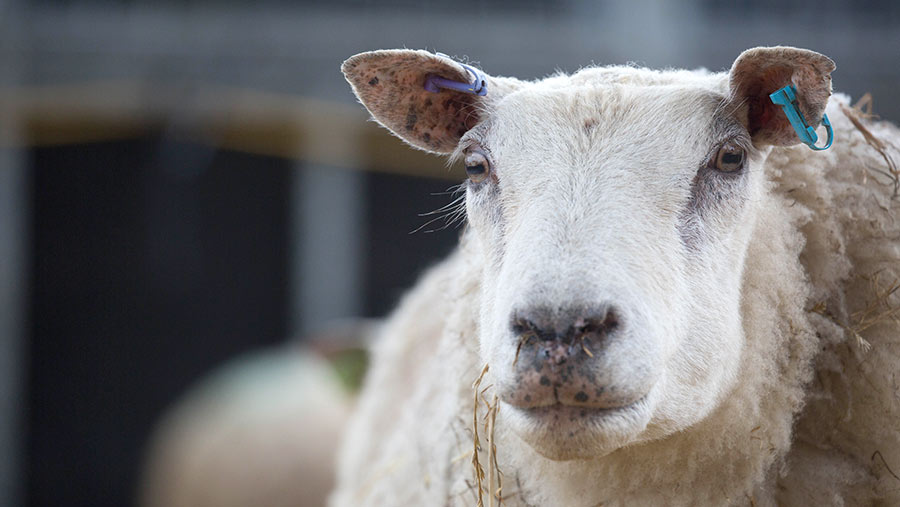What the changes to the maedi visna scheme mean for sheep farmers
 © Tim Scrivener
© Tim Scrivener Changes to the maedi visna (MV) accreditation scheme mean stricter rules for MV-accredited flocks that are buying in stock or have non-accredited sheep at the same holding.
The MV accreditation scheme for sheep is part of the broader Premium Sheep and Goat Health Schemes (PSGHS) run by SRUC Veterinary Services.
The scheme is voluntary and benefits include monitoring and detecting the disease, as well as accreditation, which can give better access to shows, sales, exports and purchasers.
“The PSGHS rules have been updated in collaboration with our advisory board comprising industry representatives. We wanted to make the rules as robust as possible while at the same time maintaining a level of practicality for our members,” said Dave Wilson, veterinary manager of PSGHS.
The two key additions to the rules, bought in earlier this year, are:
1. Mixed holdings
The first relates to holdings where non-MV/CAE-accredited animals are kept on the same holding as MV/CAE-accredited animals.
On these holdings, at every routine periodic blood test a female cull screen of 12 non-MV/CAE-accredited animals must be performed.
The rules (PDF) state:
- The flock’s/herd’s veterinary surgeon should perform the selection of animals to be tested using the criteria outlined on the submission form
- If suitable animals are not available to test as part of the female cull screen of 12 non-MV/CAE accredited animals at the time of the RPBT, the screen can be performed on a separate occasion however testing will revert to one-yearly until the test is completed
- If any animal tests antibody positive in the female cull screen the flock/herd will be classified as “high risk” and the MV/CAE accredited flock will revert to one-yearly testing
- If it can be proven by testing that MV/CAE infection has been eradicated from the non-MV/CAE accredited flock/herd, the MV/CAE accredited flock/herd can revert to two yearly testing.
- A negative female cull screen of 12 non-MV/CAE accredited animals does not indicate freedom from MV/CAE infection in the non-accredited flock/herd and strict biosecurity should be maintained
Pricing of thin ewe blood test
The price for an MV blood test of 12 thinner animals (12 months old +) is currently £39.
2. Adding accredited animals
The second change relates to adding MV/CAE-accredited animals to an MV/CAE-accredited flock/herd. This has been identified as a possible route of breakdowns because of the risk of transmission during sales/transport.
The rules state:
- All MV/CAE-accredited animals added to an MV/CAE-accredited flock/herd must be tested between six and 12 months after arrival.
- They must have been on the holding for a minimum of six months before testing.
- Failure to comply with this rule will lead to the flock/herd reverting to yearly testing. It is also strongly recommended that all added animals, regardless of age, are tested at the time of purchase before adding them to the accredited flock/herd. This would include, for example, male animals younger than 12 months, although they would also need to be tested again as above to prevent a breach of the rules.
- Any bought-in accredited animal that is to be sold on before its six- to 12-month individual test on purchased accredited animals has been completed should be tested prior to sale and then subject to the six- to 12-month test requirement once in new flock
Import guidelines
New guidelines on the import of animals, embryos and semen have also been added to the rules.
Authorisation is needed from a PGSHS vet before animals are added to the flock or semen and embryos are used/implanted, even if they are accredited in a non-UK scheme.
Semen and embryos from animals that are not accredited under a recognised non-UK accreditation scheme should not be used/implanted in MV/CAE-accredited animals. Animals that are not accredited will require testing before they can join the flock.
Scheme and prices
The full details of the accreditation and rules involved are available on the Premium Sheep and Goat Health Schemes site.
The price for annual membership of the scheme varies depending on the flock size:
- 0-10 animals aged 18 months and over – £66
- 11-50 animals aged 18 months and over – £96
- 51+ animals aged 18 months and over – £149
Blood testing costs £2.90 a head.
What is maedi visna?
A viral disease that can be transmitted via milk, colostrum, faeces and respiratory secretions. Close contact during housing can increase the risk of disease spread.
Symptoms
The name is made from two Icelandic words that mean pneumonia and wasting – the main clinical signs. Symptoms can also include mastitis. Maedi visna will reduce conception and milk yields, potentially increase premature births and lamb mortality, and reduce growth rates.
Effect on flock
The disease is highly contagious and fatal, so will lead to increased mortality rates. Infected flocks are likely to see increased culling due to chronic weight loss and poor fertility. New UK data has shown an approximate 7.3% reduction in milk yield from infected ewes.
See also: How to identify, treat and prevent the five iceberg diseases in sheep
How to find out if you have it on farm
Maedi visna can be identified through blood testing or milk sample testing.
How to prevent it
There is no vaccine for the disease. You can reduce the risk of infecting your flock by purchasing breeding stock only from maedi visna-accredited flocks.
How to control/treat it
There is no treatment for maedi visna.
